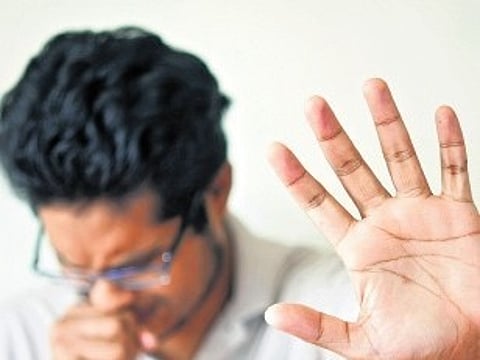
- LIFESTYLE
- FASHION
- FOOD
- ENTERTAINMENT
- EVENTS
- CULTURE
- VIDEOS
- WEB STORIES
- GALLERIES
- GADGETS
- CAR & BIKE
- SOCIETY
- TRAVEL
- NORTH EAST
- INDULGE CONNECT

"Hachooo! Hachiii! Oh, excuse me, I think it’s in the air…" After nodding at the bless yous, another sneeze. And another. Until you are absolutely annoyed at yourself and go to the doctor, who, like a good bearer of bad news, says you have pollen allergies.
Biology 101: What is pollen?
When plants reproduce, they create pollen, a fine powder. This is then released into the air during spring, summer and fall seasons. “When you come in contact with pollen, your antibodies identify that oh, these are the enemies, the allergens. This is called sensitisation. And then, an allergic reaction, where you may cough or sneeze, your eyes may water and you may get breathless,” says Dr Vyakarnam Nageshwar, allergy superspecialist and founder-president of the World Allergy Foundation.
“I don’t know which pollen I am allergic to but I sneeze and get sinuses. It impedes my day. The elders in my family never had these allergies. I stay away from festivities and don’t go out much either,” says Visakha, a 49-year-old housewife.
And before you know it, like Visakha, medicines fill up cupboards and cabinets in your pursuit to quell those allergies, even as many opt for something called allergen-specific immunotherapy. “For instance, many are allergic to Parthenium (Vayyari Bhama), which is an important flower used among 21 flowers in Ganesh Chaturthi puja. So in this form of immunotherapy, they are given gradual, periodic, low doses of diluted parthenium until they get immune to it. This is desensitisation,” he adds.
But why not do this naturally, he suggests, saying that Ganesh Chaturthi is an opportunity to start getting naturally immune to pollen.
DIY immunity
“The flowers used in Ganesh Chaturthi are also used in the festivals that follow. Each flower has some type of pollen. If you are exposed to these flowers in small quantities during the festival, you are actually becoming more immune to pollen. This is a natural, cost-friendly desensitisation,” the allergist advises.
The immunologist says that the solution is simple and is all about following a gradual, low-dose method. “Don’t hold a bunch of flowers in your hand and close to your face. Be a part of the festivities. Over time, allergies will cease and your immune system will get stronger in four to six months,” he says, further adding that avoidance is not the right path to tread.
Lifestyle problem
Dr Vyakarnam says that the rise in allergies has much to do with the way lifestyles have gone from rustic and nature-friendly to urban and indoor-friendly.
“Windows closed, air conditioning on. How can we possibly get immune? Years of staying away from nature has actually weakened our immune systems. That’s why I always advise parents to observe carefully and start this natural desensitisation early on for their children,” says the allergist.
Clearly, allergies seem to be getting the better of us this festive season. But while most of us seem to go ‘Hachooo and Hachiii’, flower vendor Ramesh is all hale and hearty, donning a wide smile as he proudly displays the vast array of flowers at his roadside shop. “My family has been selling flowers for three generations now. None of us cough, sneeze or get sick,” he chuckles.
Story by Nikita Krishna